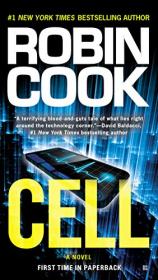Cell
Review
Cell
Robin Cook, best known for his medical thrillers, has done it again. His newest book, CELL, explores the idea of changes in the medical profession due to “the convergence of informational technology, nanotechnology, and genomics.” In this story, the three sciences are merged together in a smartphone app called iDoc. It serves as a virtual doctor that can use informational technology (the use of the smartphone to communicate with doctors), nanotechnology (the ability to implant tiny reservoirs under a patient’s skin to deliver needed medications on an as-needed basis), and genomics (the use of DNA sequencing and analysis). The fully customizable program serves as a primary-care physician that can diagnose illness and treat it, by prescribing meds and, in some cases, delivering meds remotely through the implanted reservoir.
Users of the iDoc app carry their smartphones with them at all times and keep them close enough for the app to monitor their vital signs, remind them to take their meds, and call attention to anything in their bodies that seems out of the ordinary. The manufacturer of the app, Amalgamated HealthCare, is running a trial study with 20,000 patients. For the most part, the program is working very well, even better than expected. Traffic at hospital emergency rooms has decreased significantly, and personal care doctors are getting a break from the constant stream of phone calls from patients asking for medical advice.
"I enjoyed CELL and found the topic fascinating. Cook does a good job of covering it from all angles... The book is well worth reading just to educate yourself about the future possibilities of technology and medicine."
The program is even heuristic, which in computer language means the app can “take advantage of previous solutions” and “incorporate information and solutions in its database to apply them in future problems.” In other words, the program can “learn” as it goes and makes changes accordingly to adjust to new information and ideas that it encounters.
All seems perfect, except for one thing: A few patients --- a very small number, statistically speaking --- have died rather suddenly. These individuals have several things in common. They each took part in the beta testing for iDoc, and all have serious medical issues. Plus, each was recently diagnosed with another major health problem on top of the ones they previously knew about. None of them showed any immediate signs of dying, but each died within a short period of time after receiving the news that they now had more bad medical issues to deal with. And all were in contact with Dr. George Wilson, a senior radiology resident in LA, either personally or professionally as patients in the radiology unit there.
The question is, why did these people die? Did someone use the iDoc app to kill them deliberately? Did the iDoc app malfunction and kill them accidentally? Or is something else happening? Dr. Wilson takes these questions to heart as one of these victimes is Kaley, his fiancé.
As usual, Cook covers the issue of computer-based medicine from many standpoints: as an advocate, an opponent, a learner, an outside observer, and a skeptic. Is this new technology really the best way to go? What happens when something goes wrong with the system? Can the program be sabotaged? Is it ethical?
I enjoyed CELL and found the topic fascinating. Cook does a good job of covering it from all angles (as mentioned). For the most part the story is well written, but there are points in the text where Cook “tells” the reader what is happening rather than “shows.” Although the writing could be punched up a bit to make the story more interesting, this is clearly an issue that should be taken quite seriously and talked about extensively before any such program is actually implemented. The book is well worth reading just to educate yourself about the future possibilities of technology and medicine.
Reviewed by Christine M. Irvin on March 7, 2014





